
AI gør op med myten om vores indre
Er menneskets unikke kommunikationsevne en evolutionær biologisk gave eller kulturelt opbygget over tid?
CSL Lab's @mh-christiansen.bsky.social is featured in a Danish article, discussing what bird alarm calls and Large Language Models can tell us about the evolution of human language and whether our unique communicative abilities relies on an innate language module
blog.minlaering.dk/blogindlaeg/...
09.12.2025 20:20 — 👍 0 🔁 0 💬 0 📌 0

Many congrats to Dr. Serene Wang @sere-yu-wang.bsky.social -- the newest PhD to come out of the @csl-lab.bsky.social. 🥳
She expertly defended her dissertation on "Chunking In the Second Language: Connecting Sentence Processing, Proficiency, and Memory Outcomes" 👏
18.11.2025 21:22 — 👍 4 🔁 0 💬 0 📌 2
I was just in Tokyo a couple of weeks ago. Let’s talk next week!
16.09.2025 19:13 — 👍 1 🔁 0 💬 0 📌 0
📣 If you're at #AMLaP2025 in Prague, come see the poster #184 by CSL Lab's Cris Rivera and @mh-christiansen.bsky.social:
👉 "Comparing natural language statistical learning and human intuition for chunking language"
🗓️ Thursday afternoon (Sept 4), 17:20-18:50
03.09.2025 18:47 — 👍 1 🔁 0 💬 0 📌 1
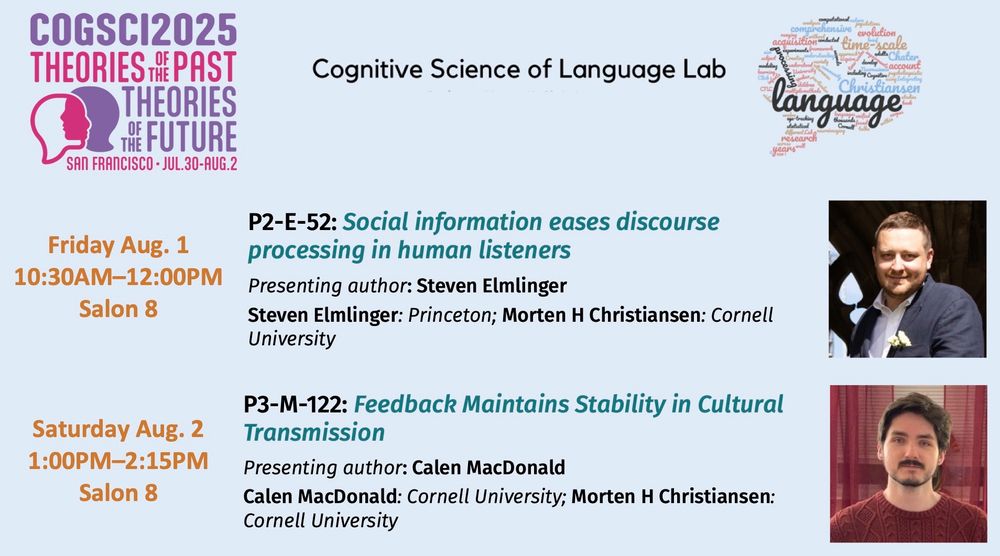
📣Come see the two posters from the CSL Lab at #CogSci2025! 👀
👉 @elmlingersteven.bsky.social is presenting his on Friday 10:30AM-12PM
👉 Calen MacDonald is presenting his on Saturday 1-2:15PM
30.07.2025 20:46 — 👍 4 🔁 0 💬 0 📌 1

Language Evolution
Want a short and accessible introduction to #LanguageEvolution? 🤔
👀 Take a look as CSL Lab's @mh-christiansen.bsky.social new contribution to the Open Encyclopedia of Cognitive Science. Get up to speed in about 1K words—check out the references for more in-depth info
oecs.mit.edu/pub/18miikqb...
22.07.2025 13:52 — 👍 3 🔁 0 💬 0 📌 0
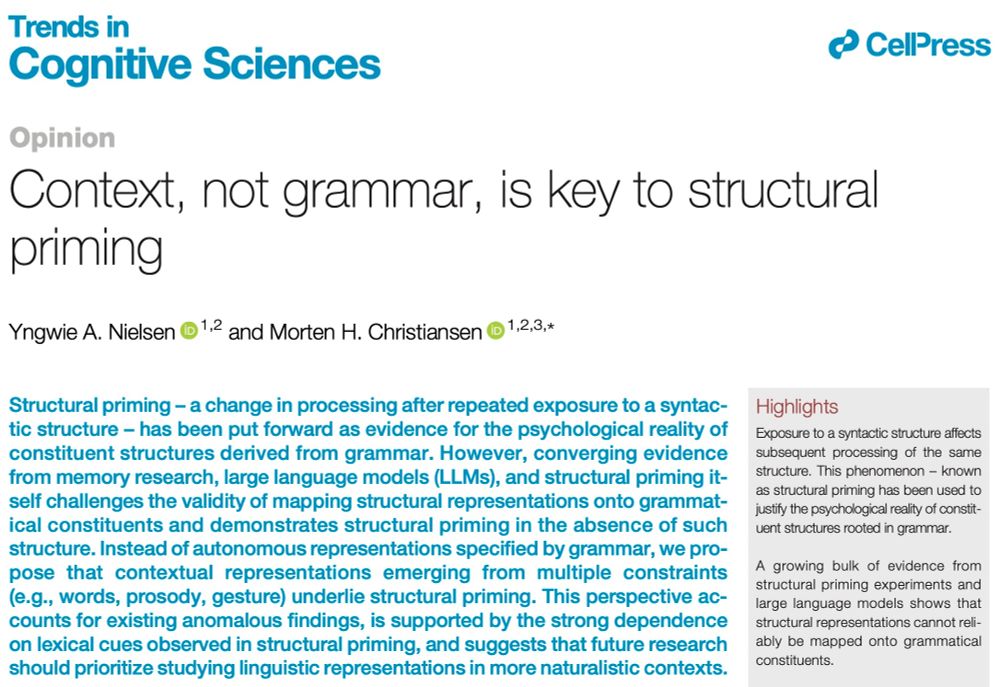
📣 New paper in @cp-trendscognsci.bsky.social by CSL-Lab's @mh-christiansen.bsky.social and @yngwienielsen.bsky.social reappraising what structural priming tells us about the representation of language: it's about context — not grammar.
Free download until Aug 8: authors.elsevier.com/a/1lIFK4sIRv...
18.07.2025 16:49 — 👍 1 🔁 1 💬 0 📌 0
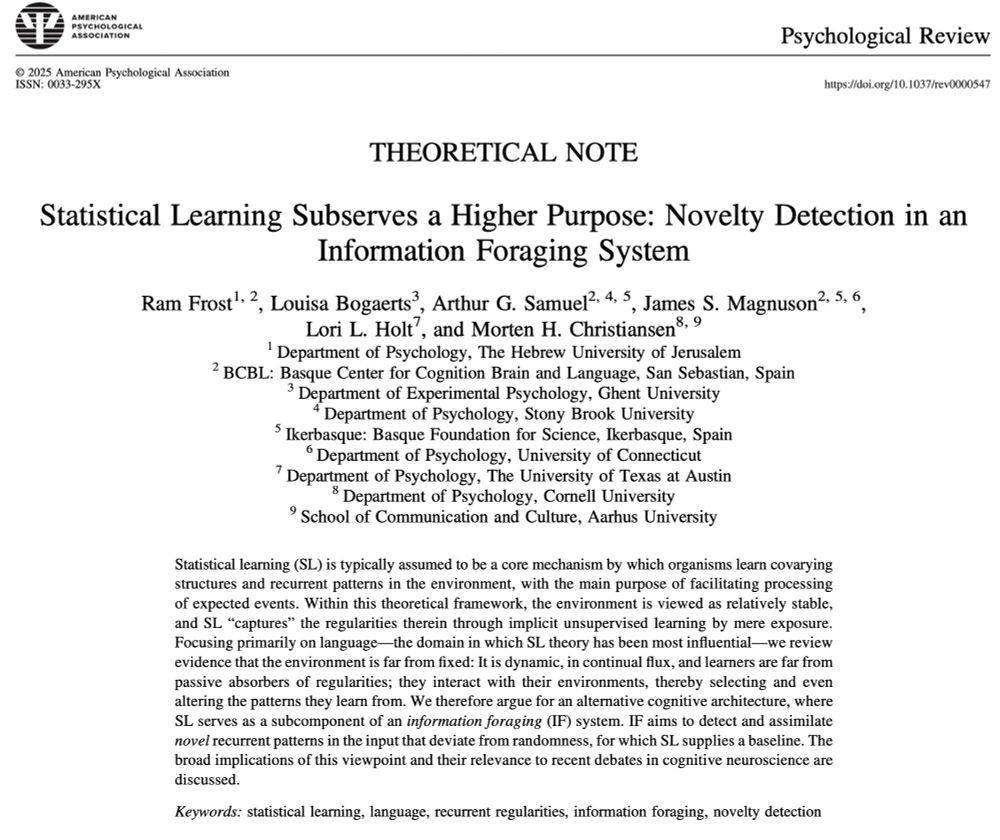
The paper is a collaborative effort with Ram Frost, @bogaertslab.bsky.social, Art Samuel, @jimmagnuson.bsky.social, and Lori Holt
27.02.2025 14:47 — 👍 1 🔁 0 💬 0 📌 0
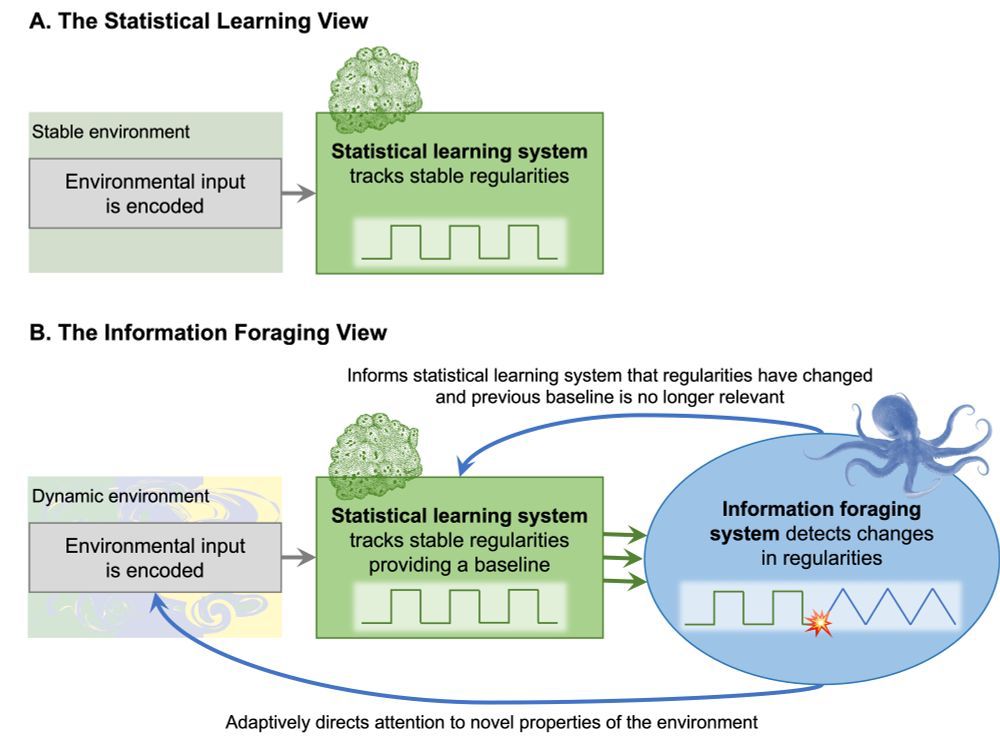
New paper from CSL Lab's @mh-christiansen.bsky.social and colleagues, rethinking the goal of #StatisticalLearning as providing the baseline against which novelty can be detected by a cognitive information foraging system
doi.org/10.1037/rev0...
27.02.2025 14:47 — 👍 2 🔁 0 💬 1 📌 0
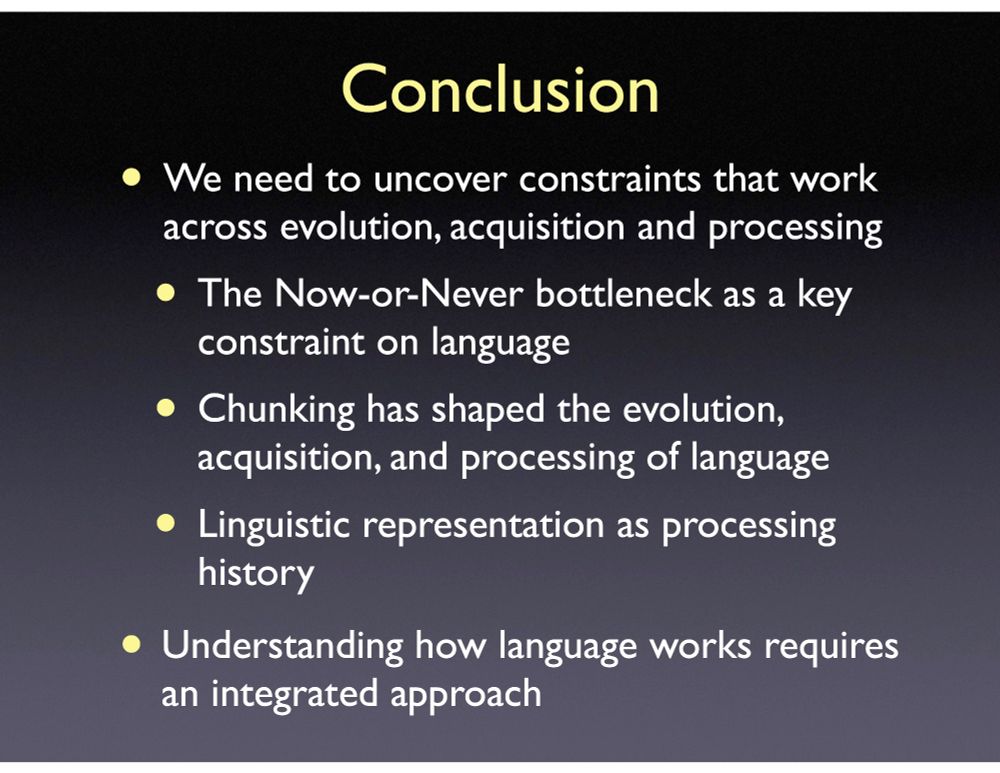
Results are presented from a lab-based cultural evolution, computational modeling, and psycholinguistic experimentation. Together, these studies suggest that cultural evolution, constrained by chunk-based learning and processing mechanisms, has shaped the emergence of linguistic structure 4/4
13.01.2025 18:41 — 👍 2 🔁 0 💬 0 📌 0
He argues that, to deal with this Now-or-Never bottleneck, the brain must incrementally chunk and integrate the linguistic input as rapidly as possible before it is gone. This perspective has profound implications for the nature of language processing, acquisition, and evolution. 3/4
13.01.2025 18:41 — 👍 1 🔁 0 💬 1 📌 0
During normal linguistic interaction, we are faced with an immense challenge by the combined effects of rapid input, short retention of sensory information, and severely limited sequence memory. How, then, can the brain successfully handle the continual deluge of linguistic input? 2/4
13.01.2025 18:41 — 👍 0 🔁 0 💬 1 📌 0
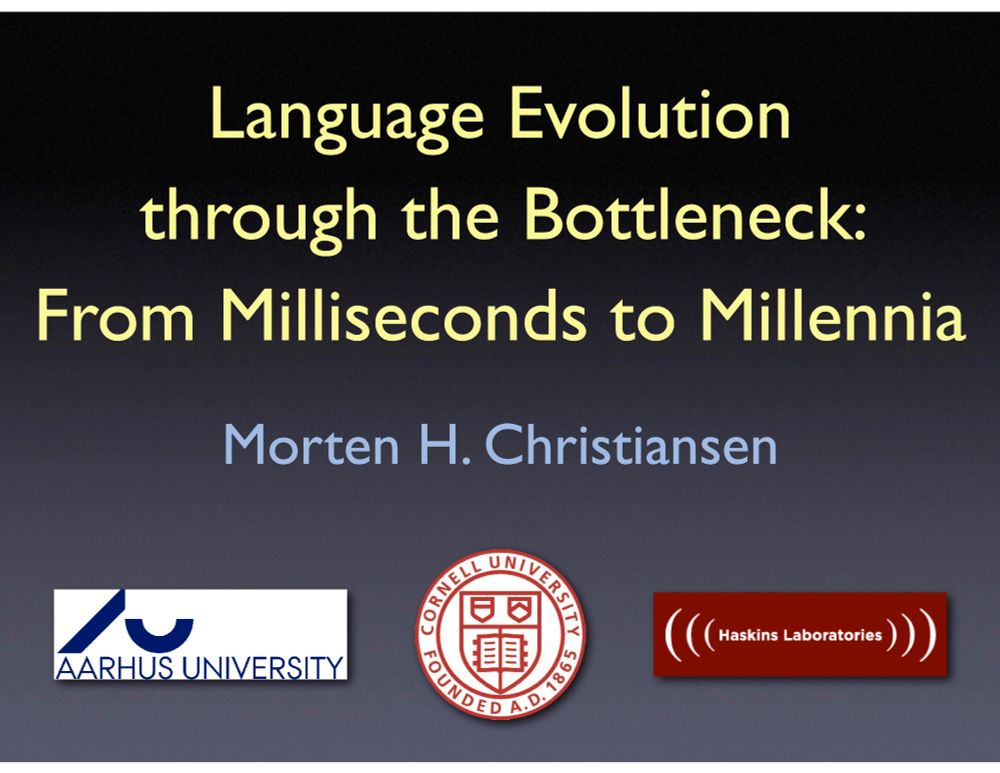
In September 2024, CSL Lab's @mh-christiansen.bsky.social gave a talk in the Language Circle series on how chunking affects language across multiple timescales with implications for the nature of language processing, acquisition, and evolution:
www.youtube.com/watch?v=xOD1...
Abstract in 🧵 1/4
13.01.2025 18:41 — 👍 2 🔁 0 💬 1 📌 1
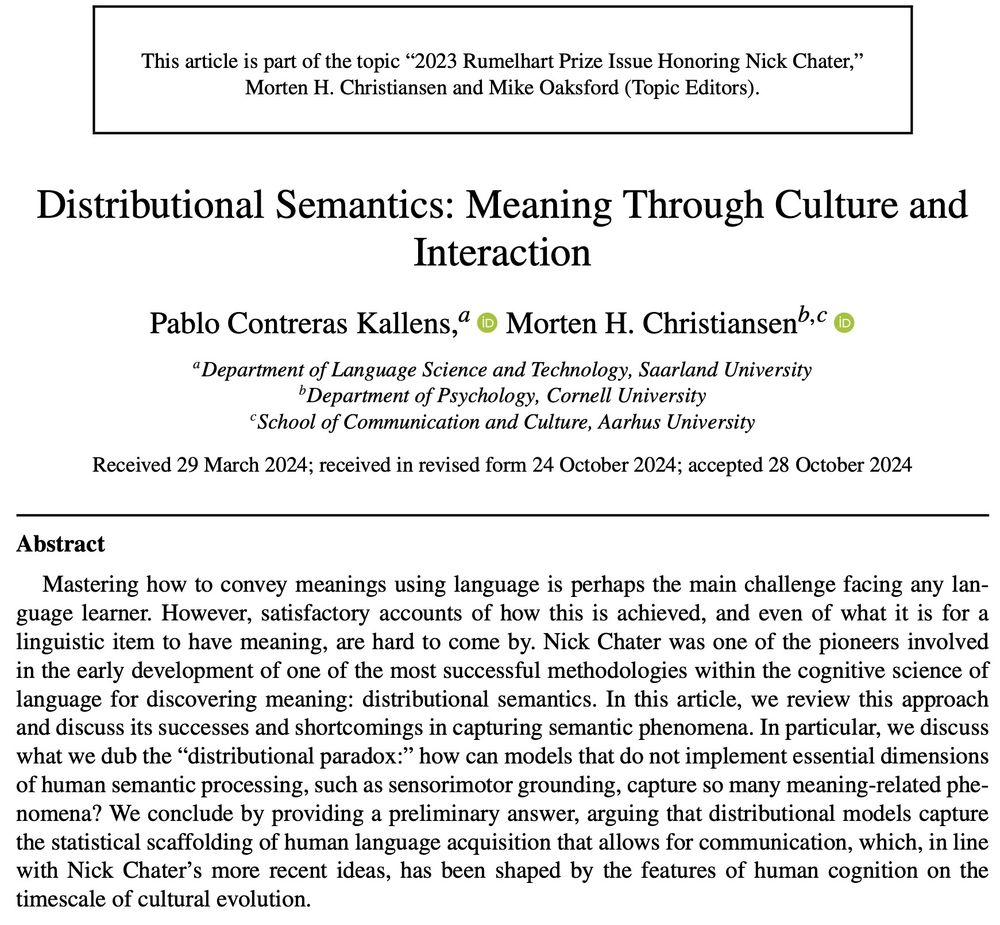
New CSL-Lab paper out by alumni Pablo Contreras Kallens and @mh-christiansen.bsky.social: Distributional Semantics: Meaning Through Culture and Interaction (including discussions of meaning in LLMs)
👉 Read it for free here:
onlinelibrary.wiley.com/share/author...
27.11.2024 00:59 — 👍 2 🔁 0 💬 0 📌 0
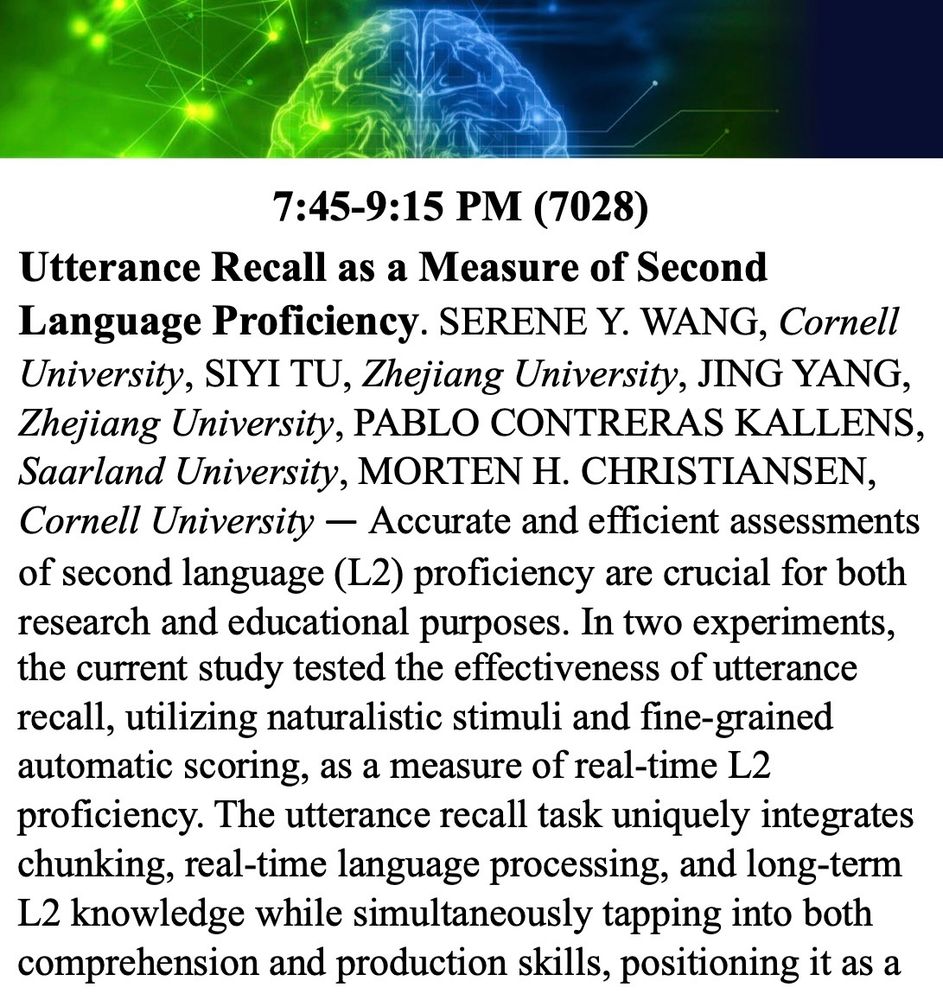
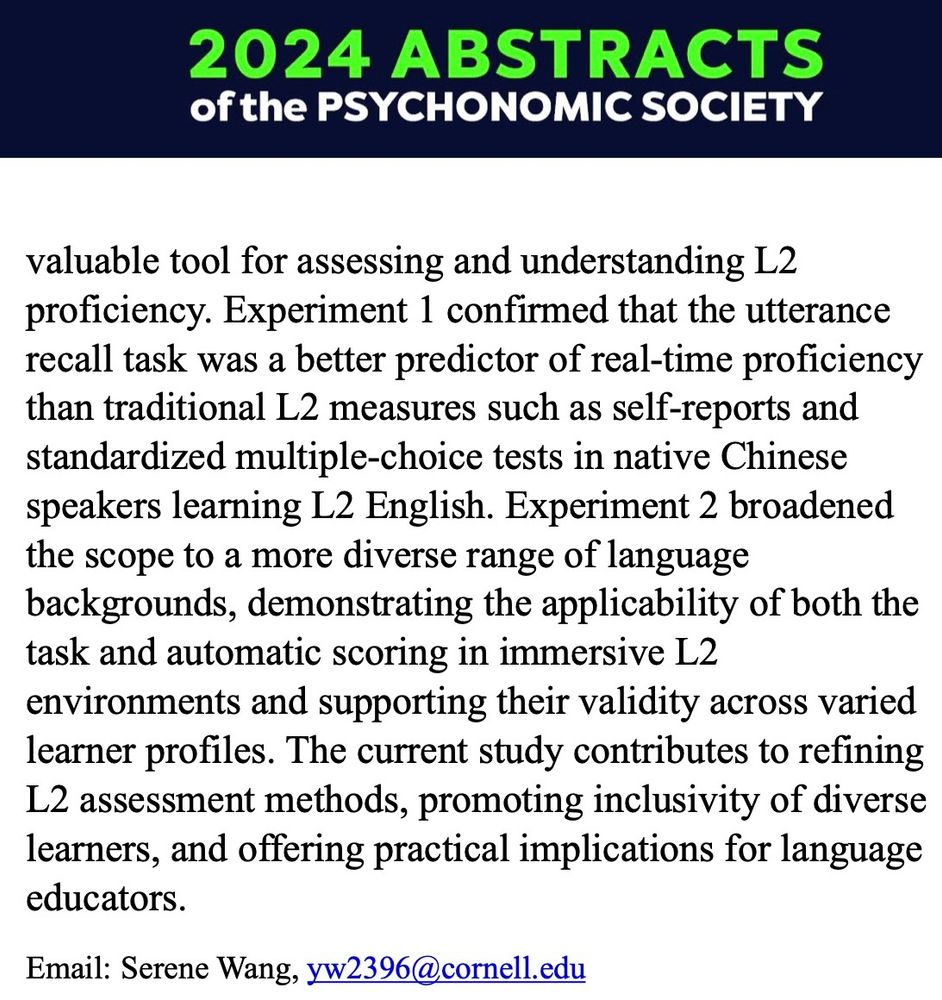
If you're at #psynom24 go see the poster by CSL-Lab's Serene Wang about how to best measure real-time language skills: "Utterance Recall as a Measure of Second Language Proficiency: Cross-Linguistic Applicability and Fine-Grained Automatic Scoring" # 7028 in the poster session tonight, 7:45-9:15PM.
23.11.2024 15:42 — 👍 2 🔁 1 💬 0 📌 1

kermit the frog is standing behind a red curtain .
ALT: kermit the frog is standing behind a red curtain .
Very happy for the CSL Lab to have joined bluesky! Look here for posts about the various lab members' papers and presentations. 😀
More to come soon! 👀
15.11.2024 23:59 — 👍 1 🔁 0 💬 0 📌 0
Psycho/Neurolinguist at #NEPLab @IussPavia studying Experimental Pragmatics & Pragmatic Language Disorder. In love with metaphors. PI of #ERCCoG PROMENADE
Aarhus University-based research center dedicated to understanding the influence of artificial intelligence on text culture. Learn more here: https://arts.au.dk/en/text.
Research into #Development #Education #Empowerment #Movement #Autism #Disability #Neurodiversity #Communication #Engagement and #Identity etc.
in the School of Psychology, Sport and Health Sciences at the University of Portsmouth
Cognitive Scientist at Max Planck, Professor of Psychology
https://www.falkhuettig.com/
Author of 'Looking Ahead: The New Science of the Predictive Mind' published by Cambridge University Press on 6 March 2025.
NIH K99 postdoc at Yale University in Dick Aslin's LLAMB Lab, studying statistical learning, memory, and language development. PhD: @Cornell @csl-lab
Linguistics and cognitive science at Northwestern. Opinions are my own. he/him/his
Assistant Professor of Psychology @ SUNY Plattsburgh | Cornell Psychology Ph.D | 🇳🇱 | Studies language learning and processing
L2 Chunker | Cornell Psych
The CoCoCo Lab studies how our sensory and cognitive abilities are determined by experience and culture. PI: Nori Jacoby
@norijacoby.bsky.social https://www.norijacoby.com/cococo.html
Cognitive scientist interested in the processing, acquisition and evolution of language; statistical learning; computational modeling.
Lab website: https://csl-lab.psych.cornell.edu
Promoting Cognitive Science as a discipline and fostering scientific interchange among researchers in various areas.
🌐 https://cognitivesciencesociety.org
Psycholinguist | Cognitive Scientist | Data Scientist |
Website: https://www.dogusoksuz.com/
🔗 https://ryu.sg 🌏Asst Prof @Singapore University of Technology and Design (SUTD) 〜Human cognitive ecology; Human-Centered AI; Cultural evolution 〜 Previously 🇩🇪 ←🇬🇧 ←🇨🇦 ←🇺🇸 ←🇯🇵〆
A hub for language innovation and collaboration at Cornell University.
Cognitive Science, #ManyBabies, Transparent Science, Networking, Communication, and a big helping from the Open Science Buffet
Cargo biker, Fairphoner, Parent
she/her
sie/ihr (Sg)
Developmental Scientist - how are babies learning languages?
Word learning, infant speech perception, language assessments and open science.
https://www.sv.uio.no/psi/english/people/academic/julienma/index.html
We are a team of researchers led by Prof. Ewa Dąbrowska, researching language acquisition and attainment. Funded by the Alexander von Humboldt Foundation.
https://www.angam.phil.fau.de/fields/engling/chair-of-language-and-cognition-prof-dabrowska/indivi
Cognitive Science at Aarhus Uni. Curious about social interactions, symbolic behaviors, and meta-science. Focus on stats, computational modeling, machine learning, complex systems, language, exp semiotics and neuropsychiatric conditions. He/They.
Prof of Psychology/Child Language, University of Manchester. Author of PSY-Q, Are You Smarter than a Chimpanzee? and The Stories of Your Life
The British Psychological Society's magazine, born in 1988, available in print for members, online and app.
http://www.bps.org.uk/psychologist
Posts/views: Editor Dr @jonsutton.bsky.social and Deputy Editor @jennifergledhill.bsky.social.















